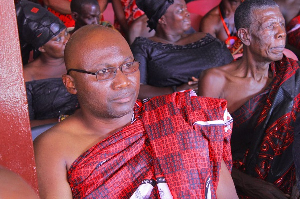Opinions of Sunday, 11 June 2017
Columnist: Benjamin Mensah
How safe are tourist sites in Ghana?
I was happy to meet again Mr Kobby Asmah, the political editor of the Daily Graphic, last Friday, May 26 at the palace of the National Chief Imam at Fadama, in Accra.
The last time we met was at Akosombo, almost nine years ago, and he gave me a lift in his car from that scenery river-town to Accra.
I noticed that Mr Asmah, walking together with ace cameraman Ebo Hansen, with whom I was covering the same beat some time ago, could not make me out. So I re-introduced myself to Mr Asmah, and we reminiscence on our journey to Accra, recalling that we talked about the beautiful lush on the way back to the capital city, Accra.
We covered an inter-party seminar by the political parties then contesting the 2008 general election, and coming back to Accra, Mr Asmah “soaked” me in country music played on the machine in his car.
It was a soothing experience. That ride etched on my mind.
I can recall also the visit of the Parliamentary Press Corps to the Akaa Falls, at Huhunya in May 2007, .and a revisit to the same place with my cousin Ernest Pinto last two years, in 2015.
Pinto and myself trekked from Huhunya to the Akaa Falls, through the cottage hosting the twin palm trees, the umbrella rock area, through the rocky mountainous areas to the Boti Falls, where I bathed in the waters of the fall.
Also on December 2012, I left Accra early in the morning to Kukurantumi, in the Eastern Region to stay for at least a day to study the town and the community which the novel writer Kaakyire Akosomo Nyatakyi used to plot his book Ancestral Sacrifice.
On December 13, 2014, I was part of a group of journalists who went on a canopy walk at the Bunso Arboretum.
A few weeks later, there was news that the walkway had broken down and it was very disastrous.
So the question is how safe are our tourist sites? The nation can earn a lot from tourism. In fact, looking at the Eastern African countries, Ghana stands to benefit a lot from developing her tourism potentials.
However, events like the recent Kintampo Waterfalls disaster and the one that occurred at Bunso Arboretum put fear in potential tourists.
It is therefore welcoming that Parliament is throwing the searchlight on the promotion of tourism, safety and protection at the nation’s tourism sites.
It is noteworthy that a chunk of the travelling in Ghana is done by roads, but unfortunately accidents have assumed alarming proportions that Dr Okoe Boye, MP for Ledzokuku, in a contribution to a statement in Parliament on the activities of the National Disaster Management Organisation (NADMO) described the situation as a national disaster.
What do we do to protect our road travellers?
What about the encroachment on the environment? The nation is waging a war on illegal mining called “galamsey,” and a soldier, passionate about the environment, has lost his life though the dirty and stained hands of “village people” at Denkyira Obuasi in the Central Region.
Whatever he did that made the people kill him does not in any way justify their barbaric and dastardly act. What protection are we giving to security persons at tourism sites?
On the occasion to mark 2017 World Environment Day, Madam Patricia Appiagyei, Deputy Minister of Environment, Science and Technology, noted that despite recent and past efforts aimed at ensuring environmental sustainability, the world and Ghana for that matter still continue to face new and emerging environmental challenges that need to be addressed with a sense of urgency.
She noted that land degradation, water pollution, deforestation and the destruction of biodiversity in on the ascendency partly because of illegal mining activities in some parts of the country.
“The hard truth is that the impacts of these negative human activities on the environment is felt nation-wide in the lives of our citizens and the economy, including high water treatment costs, the spread of water-related diseases and infections, loss of arable lands, destruction of farms, pollution and reduction of fishery resources among others,” she said.
One other area of concern is sanitation and waste management. How clean are our beaches?
I was at Akplabanya, a coastal town in the Greater Accra Region, with a delegation of former Vice President Kwesi Amissah-Arthur in 2012. We were greeted with a very ugly site at entry, which could be verified, pictured when one googles the name of that town. If the situation has now changed for the better, then kudos!
Akplabanya is not isolated. What about the beaches at Teshie, Nungua, La, Osu James Town, Korle Gonno and Chorkor all in the Region? When will the open defecation at some coastal towns in Ghana stop?
And, what about the beaches in Ekumfi Narkwa, Cape Coast and Elmina in the Central Region?
Sanitation is really a problem also at the Umbrella Rock site in the Eastern Region.
The last time I visited the place, it was strewn with a lot of refuse.
And the perennial floods in some parts of the country, when will they end?
Still on the 2017 World Environment Day, Mr Emmanuel Agyarko, the Chairman of the Parliamentary Select Committee on the Environment, romanticised the uniqueness of the Atiwa Range Forest Reserve, which is a home to the head of waters of three major rivers as well as a source of drinking water for cities in the Greater Accra, Central and Western Regions.
However there is severe land degradation at the fringes of the forest as a result of illegal mining activities.
Mr Agyarko assured the nation that members of the Select Committee would take it upon themselves to champion the cause to protect the nation’s water resources for present and future generations as they regularly visit their constituencies.
Dr Mark Kurt Nawane, MP for Nabdam and a member of the Environment Select Committee added to the call to make more visits to the nation’s tourist sites, but wondered the kind of safety measures are there.
“There is an urgent need to educate the citizenry to have clean healthy environment,” Dr Nawane advised.













